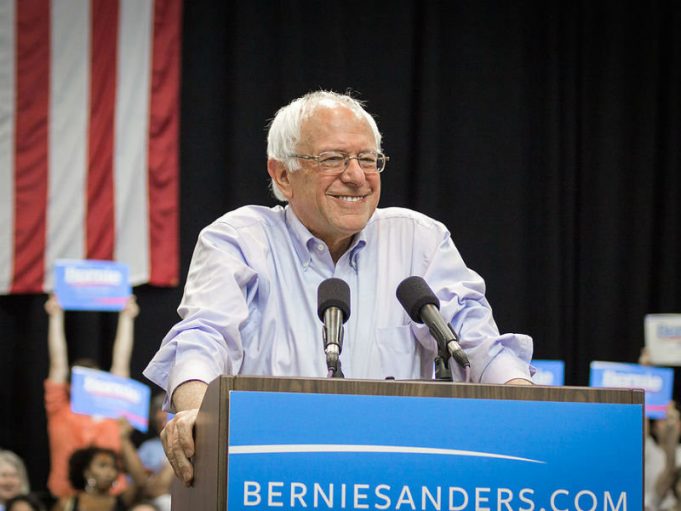 As a reactionary response to the election, incoming minority leader Sen. Charles Schumer (D-NY) decided to expand the democratic senate leadership team from seven members up to 10. It should be noted that Sen. Cory Booker, the only black Democratic U.S. senator in the 114th congress, was not offered a leadership position. Sen. Kamala Harris (D-CA) will be the third African American serving in the upcoming 115th congress. As a freshman, she wasn’t offered a leadership spot either.
As a reactionary response to the election, incoming minority leader Sen. Charles Schumer (D-NY) decided to expand the democratic senate leadership team from seven members up to 10. It should be noted that Sen. Cory Booker, the only black Democratic U.S. senator in the 114th congress, was not offered a leadership position. Sen. Kamala Harris (D-CA) will be the third African American serving in the upcoming 115th congress. As a freshman, she wasn’t offered a leadership spot either.
Schumer, suffering from a sudden lapse of clear judgment, instead tapped Bernie Sanders (I-VT) as chair of outreach for the senate Democrats. The same Bernie Sanders that was rejected by black presidential primary voters is now the mastermind charged with the responsibility that was nonexistent in his failed presidential primary bid.
The Independent senator from Vermont has no African-American staffers, of any rank, in his senate office. In fact, the highest ranking African American employee in the whole of the U.S. Senate is Jennifer DeCasper. Jennifer works for Sen. Tim Scott – that’s right, the black Republican from South Carolina.
The title of Sanders’ most recent book is “Our Revolution: A Future to Believe In.” But Bernie, it’s not “our” political revolution; it’s your political revolution, and it lost.
Sanders, the favorite comrade of the progressives, fails to mention a single black presidential campaign staff member in his book – not even a sentence about Symone Sanders, who served as his national communications director after he poached her from the Black Lives Matter Movement. There’s at least a photograph of my friend Marcus Ferrell in the book, a shot of him leaving the neighborhood where Freddie Gray was killed in Baltimore appearing on page 377.
Modern American liberalism and the progressive movement is going to have a difficult time winning future elections because it is plagued with painfully obvious problems – in which Bernie Sanders is no panacea.
The Democratic party lacks diversity where it counts. The constituencies under the big tent of the Dems is multifaceted, yet the apparatus is homogeneous.
There’s also a money problem. Campaigns are big business, but it seems that the Democrats’ sentiment of inclusion falls short of its colorful talking points.
PowerPac Plus, a Democratic organization, released a report in 2015 that found that only 1.7 percent of the money the Democratic Party spent during the 2010 and 2012 election cycles (2016 data not yet available) went to firms owned by minorities — just $8.7 million of $514 million spent. The report examined expenditures from the Democratic National Committee, the Democratic Congressional Campaign Committee and the Democratic Senatorial Campaign Committee. That’s atrocious.
In order to effectively communicate to diverse communities, it is imperative for campaigns to hire, retain and contract with the firms that are represented by the constituencies that oft lean left. A white campaign consultant may often miss the mark when trying to design a political mailer that will be distributed in a Latino community. Wouldn’t it make more sense for an African American media consultant be contracted to write the scripts that will be aired on predominantly black radio?
Campaigns require lots of creativity. It’s unfortunate that the political party that lives on the participation of people of color provides minuscule spending with businesses that reflect the rainbow coalition.
Then there’s the fallacy of progressivism.
Black voters are the most loyal supporters of Democratic candidates. At least 80% of African American voters have turned out for the Democratic presidential candidate since the 1960 election of John F. Kennedy.
There is no American demographic that could more greatly benefit from progressivism than black folk. Wisconsin incarcerates more black men than any other state. The Badger State has been ranked as the worst place to raise a black child. There’s a skills gap and an education gap. Black students are suspended and expelled at higher rates than their white, Latino and Asian counterparts.
The income gap, the comparatively low levels of home ownership and even decreased life expectancy are all areas where progress is sorely needed. Yet, there doesn’t seem to be a Democratic policy agenda to address these issues. Instead, there is lip service and no shortage of campaign promises.
It’s telling that the progressive movement offers few solutions for their most faithful partisan voters. After this election, we are now told that working-class whites are the priority – as if working-class blacks are free from struggle. The president-elect won white men, and the left must do everything in their collective power to regain that electorate while everyone must sit in the back of the bus.
The narrative has been repeated like a catchy pop song hook: The Republicans are racist! Well, I have always subscribed to the notion that the epithet you cast on your opponent is the very characteristic you’re trying to mask in yourself. There’s still plenty of room in the proverbial “Basket of Deplorables.”
Look, I’m under no illusion about the Republican party. Between the federal court ruling that legislative districts in Wisconsin were gerrymandered and the use of voter suppression tactics, the modern GOP has made it clear that they can win elections without the black vote.
2018 will be here before we know it, a year in which elections for U.S. senate, congress, governor and state legislators will take place. I’m cautiously optimistic that the Democratic party and its response will note the value of its black voters, staffers and political consulting firms. If not, the entire party will descend even deeper into minority status just like the electors they seem to take for granted.










